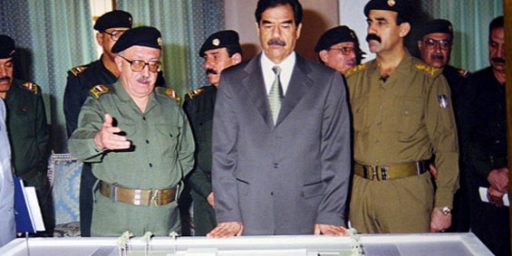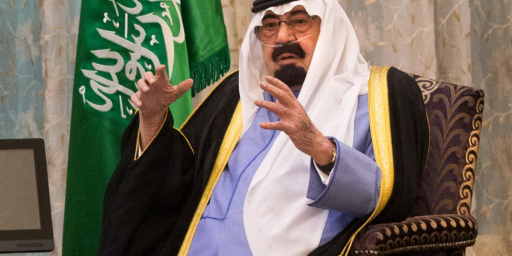Maliki Out as Iraqi PM?
There may be a significant reshuffling of Iraq’s cabinet.
Major partners in Iraq’s governing coalition are in behind-the-scenes talks to oust Prime Minister Nouri al-Maliki amid discontent over his failure to quell raging violence, according to lawmakers involved. The talks are aimed at forming a new parliamentary bloc that would seek to replace the current government and that would likely exclude supporters of the radical Shiite cleric Muqtada al-Sadr, who is a vehement opponent of the U.S. military presence.
The new alliance would be led by senior Shiite politician Abdul-Aziz al-Hakim, who met with
President Bush last week. Al-Hakim, however, was not expected to be the next prime minister because he prefers the role of powerbroker, staying above the grinding day-to-day running of the country.
While politics makes strange bedfellows and putting together a workable coalition in Iraq is, to say the least, quite difficult, it has never made sense to include Sadr’s allies in the Government without demanding that he stop backing violence against said government.





I don’t know Iraqi politics, but the only way an anti-Sadr coalition will work is if strong-enough anti-Sadr militias join together. (Where “militia” is the military arm of the “parties” … I’m assuming any party worth considering has its parallel militia.)
In other words, if it ain’t a civil war yet, it’s gonna be.
Ha! And I wonder how many of those “major partners” are caucasian & live in DC…
Hi James,
Raed in The Middle, the Iraqi blogger, had a story from a Jordan newspaper story back on the 4th Dec. Only then, the broadly-based “national salvation front” included the Sadrists and didn’t include SCIRI and Al Hakim.
So now it looks like we may have two nascent new governments that both intend to usurp the Maliki government. My guess is that the SCIRI one will get the backing of the U.S. but that the other one will get the backing of most of the Iraqis with guns. The Chinese proverb “May you live in interesting times”, eh?
Regards, C
Cernig,
My presumption, perhaps incorrect, is that al-Hakim and friends intend to achieve their aims via the normal processes by which plurality coalitions in parliamentary systems are broken and replaced by new ones.
James,
That’s my understanding of both group’s plans. There’s a possibility that this may lead to a new phase of two-party democracy, both parties with broad spectrum support, that could defuse the current sectarian violence.
Then again, it may just be that, yet again, just as everyone else thinks they have a handle on who is fighting who and why, the Iraqis decide to change it up.
I am, like Heinlein, an “optimist by nature and a pessimist by temperament”.
Regards, C
“Plurality coalitions”? There is a majority in Iraq, and that majority is Shiite. Unless you had cross-sectarian parties (a la India, for example), you will not get electoral alternation in power. (I am assuming the reference to “plurality coalitions” had a sylized version of the UK in mind.)
Obviously, Iraq does not have cross-sectarian parties. It does have sub-sectarian parties, which could be a good sign of the pluralism needed to generate alternation. If each one did not have its own militia…
Sadr’s allies are part of the UIA, which is a pre-election coalition of Shiite factions, each of which (and not only Sadr) has its own militia.
It looks like any alternation that comes will be of the inter-election reshuffling variety (as the first line of the main post implies), not of plurality blocs alternating in power. And that shuffling will be in large part determined by the capacity of factions to employ violence.